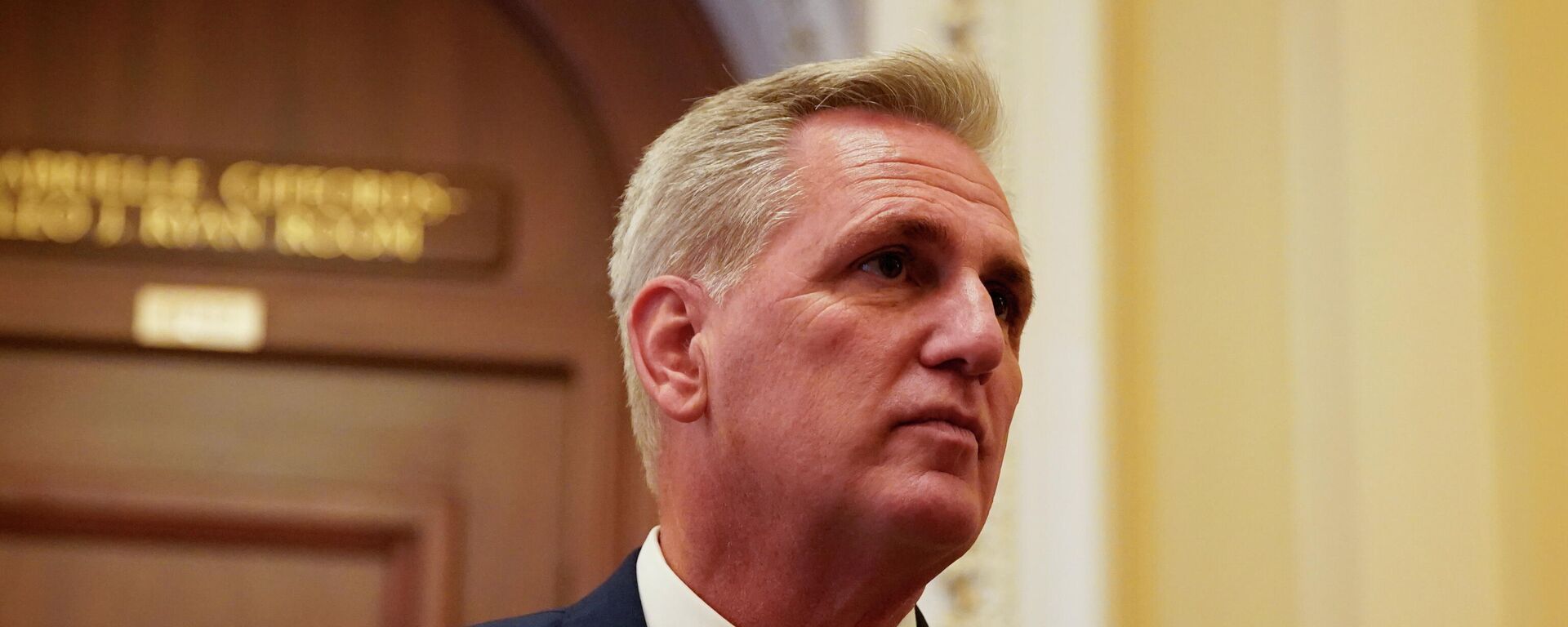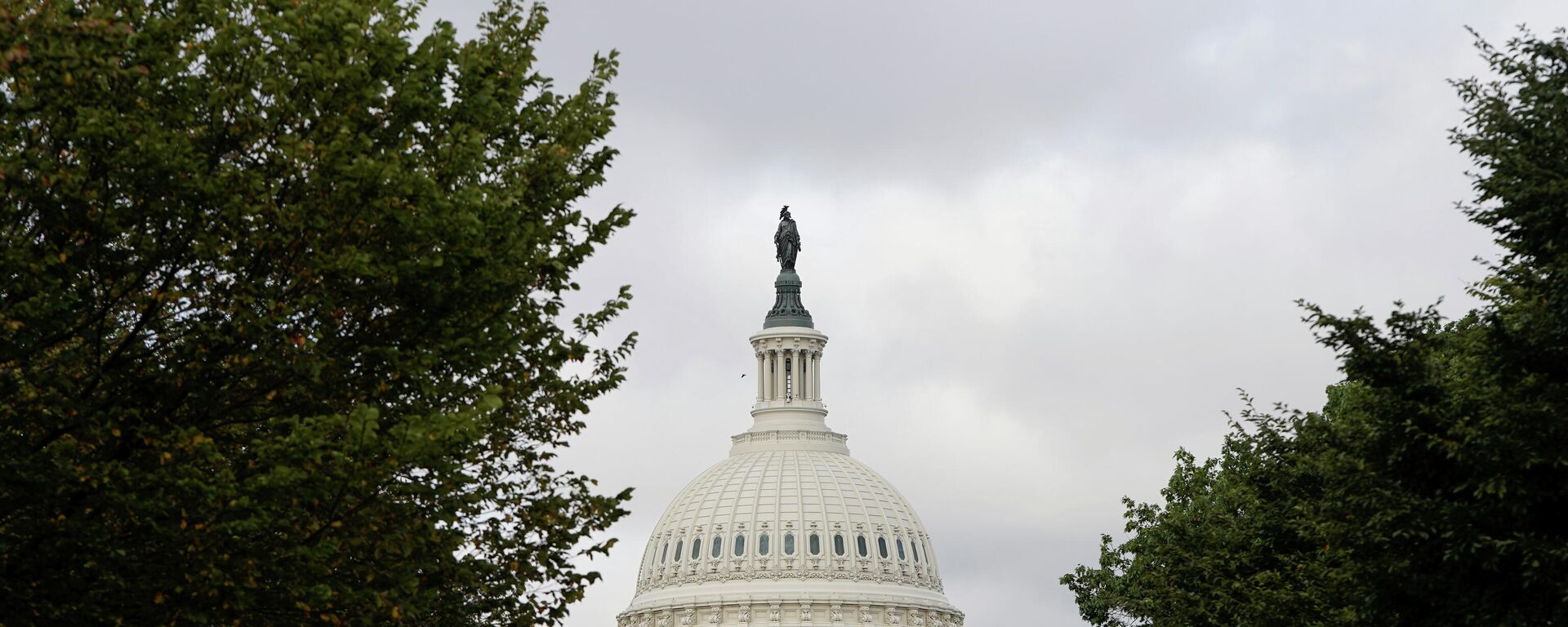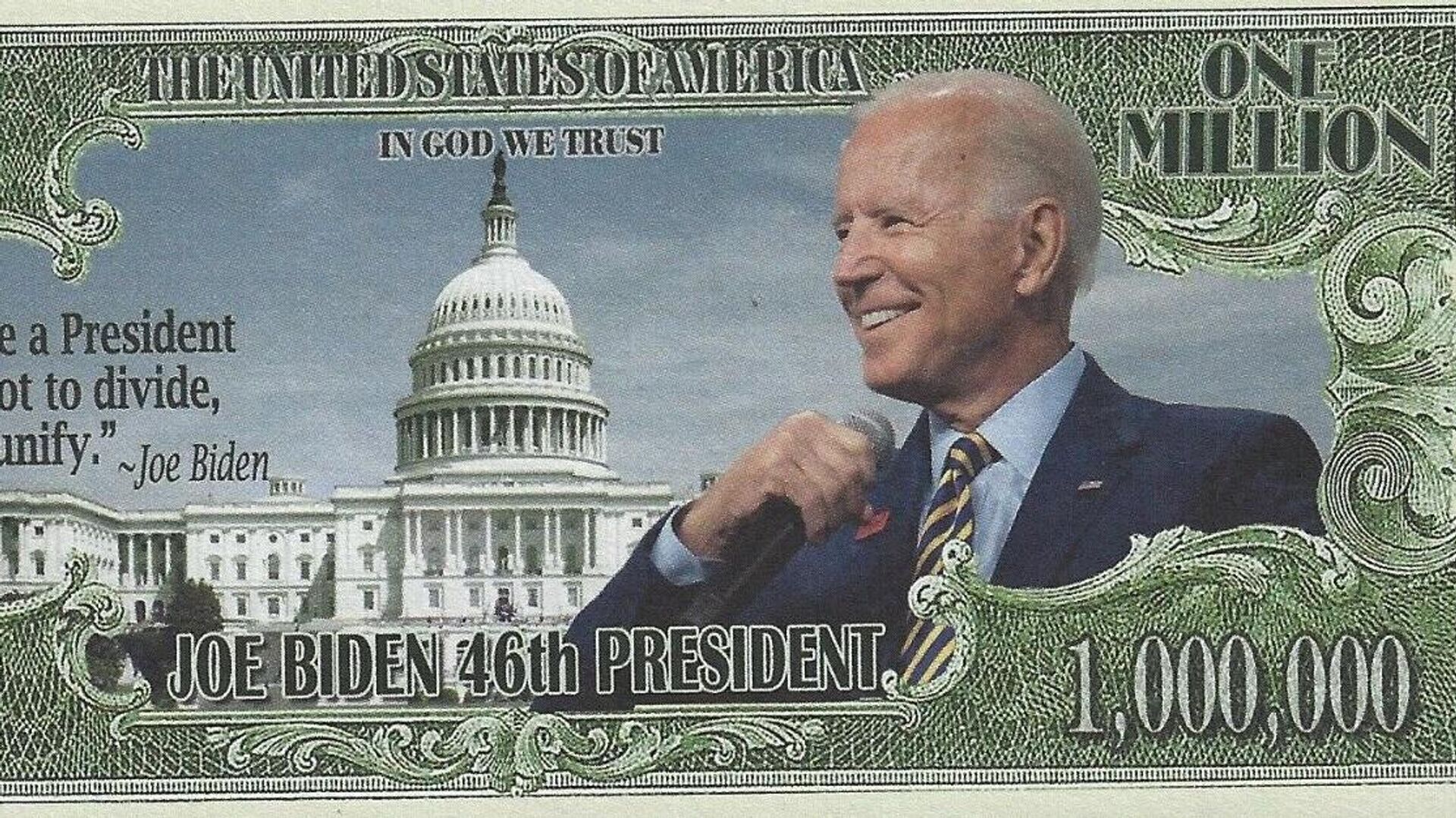https://sputnikglobe.com/20211022/biden-repeats-contentious-claim-that-his-multi-trillion-dollar-spending-plan-will-cost-nothing-1090135015.html
Biden Repeats Contentious Claim That His Multi-Trillion Dollar Spending Plan Will Cost Nothing
Biden Repeats Contentious Claim That His Multi-Trillion Dollar Spending Plan Will Cost Nothing
Sputnik International
The president has been out pushing his signature ‘Build Back Better’ agenda, plus a $1.2 trillion infrastructure bill, at public events, on TV, and through... 22.10.2021, Sputnik International
2021-10-22T13:16+0000
2021-10-22T13:16+0000
2021-10-22T13:16+0000
joe biden
spending
https://cdn1.img.sputnikglobe.com/img/07e5/0a/16/1090134989_360:0:1475:627_1920x0_80_0_0_18e64067589a48dd81850b6c4d231df8.jpg
President Joe Biden repeated a contentious claim on his Build Back Better spending plan, suggesting that the trillions in new spending won’t actually cost Americans a cent.“We have two plans. One is the infrastructure plan – roads, highways, bridges, buses, trains, etc. The other one is what I call the Care Economy, has a lot of money in there for the environmental remediation as well as Care Economy,” Biden explained, speaking at a town hall hosted by CNN in Baltimore Thursday night.The president did not specify what he meant by “raising one single cent.” However, in previous public discussions on the matter, Biden indicated that the BBB agenda would cost Americans “zero dollars,” and constitute a “once-in-a-generation investment in working America.”At a separate public event a day earlier, Biden said that “the cost of the Build Back Better bill, in terms of adding to the deficit, is zero because we’re going to pay for it all. In addition to that, half of it is a tax cut.”“It’s not spending money; it’s a tax cut for working-class people,” he said at an appearance in Scranton, Pennsylvania.Instead of new additions to the deficit, the BBB bill calls for higher corporate tax rates, plus a hike in taxes on those making over $400,000 a year. Republicans have vowed to boycott the bill altogether, while a minority of fiscally conservative Democrats have also expressed opposition to the proposed spending in its current form.GOP lawmakers have relentlessly attacked Biden over his “zero dollar” cost claims, accusing him of being “economically illiterate” and suggesting that his estimates were an outright “lie.”On Wednesday, a group of 160 GOP lawmakers penned a joint letter to Biden urging him to tackle the supply chain bottleneck facing America before pushing his “socialist big government agenda” of new spending and tax hikes.Resistance to the $3.5 trillion proposed spending by naysayer Senate Democrats Joe Manchin and Kyrsten Sinema has forced the administration to lower its expectations on the BBB’s final size, with the spending package whittled down to about $1.9 trillion. At the same time, however, the progressive wing of the Democratic Party has threatened to withhold its support from the $1.2 trillion infrastructure bill if BBB spending wasn’t high enough.In his CNN town hall Thursday, Biden expressed confidence that he was close to a deal on the spending, joking that he’s been “a senator for 370 years,” and saying he was “relatively good at putting together deals.”FDR LiteBBB is a 10-year spending package focusing on social and climate programmes, including proposals to dramatically expand Social Security and Medicaid, childcare and child tax credits, paid leave and education, including post-secondary education. The package’s climate provisions include spending to convert America’s electricity sector to run mostly on clean energy, and subsidies to and infrastructure construction for electric vehicles. The bill has been characterized as the largest new federal spending proposal since Franklin Roosevelt’s New Deal and Lyndon Johnson’s Great Society programmes.The trillions of additional dollars in proposed spending comes after nearly $8 trillion in stimulus was already been poured into the US economy over the past-year-and-a-half amid the Covid-associated economic crisis, and despite fears that the United States could default on its already gargantuan $28 trillion+ in federal debt.Earlier this month, Congress cut an emergency compromise deal to raise the debt ceiling until December. The agreement was reached after Treasury Secretary Janet Yellen warned that America would run out of money and go bankrupt by mid-Octboer if the limit was not raised. Senate Minority Leader Mitch McConnell has already threatened not to assist Democrats a second time around after accusing the ruling party’s leaders of behaving in a “partisan, angry and corrosive” fashion.US lawmakers first introduced the concept of a debt ceiling – or the amount of money that the United States federal government could legally borrow, in 1917 to help finance the country’s involvement in the First World War. Since then, the original cap –set at $11.5 billion (equivalent to about $245 billion in today’s dollars) has ballooned by over 2400%, with the limit raised over 100 times. The debt, plus the dollar’s status as the world’s de facto reserve currency, has allowed the federal government to spend significantly more than it collects in tax revenues on things like a $700 billion+ annual defence budget, Medicaid, education, health care and foreign aid. However, a growing number of economists have expressed concerns that current debt levels are unsustainable, and that the dollar’s current status may not last forever.
https://sputnikglobe.com/20211021/160-republicans-urge-biden-to-stop-pushing-socialist-big-govt-agenda-address-supply-chain-crisis-1090085804.html
https://sputnikglobe.com/20211009/following-schumers-hysterics-mcconnell-pledges-no-help-with-next-debt-limit-hike-in-december-1089783198.html
Sputnik International
feedback@sputniknews.com
+74956456601
MIA „Rosiya Segodnya“
2021
News
en_EN
Sputnik International
feedback@sputniknews.com
+74956456601
MIA „Rosiya Segodnya“
Sputnik International
feedback@sputniknews.com
+74956456601
MIA „Rosiya Segodnya“
joe biden, spending
Biden Repeats Contentious Claim That His Multi-Trillion Dollar Spending Plan Will Cost Nothing
The president has been out pushing his signature ‘Build Back Better’ agenda, plus a $1.2 trillion infrastructure bill, at public events, on TV, and through behind-the-scenes phone calls with congressional leaders. The new proposed spending comes despite a close call on the debt ceiling which nearly caused America to default earlier this month.
President Joe Biden repeated a contentious claim on his Build Back Better spending plan, suggesting that the trillions in new spending won’t actually cost Americans a cent.
“We have two plans. One is the infrastructure plan – roads, highways, bridges, buses, trains, etc. The other one is what I call the Care Economy, has a lot of money in there for the environmental remediation as well as Care Economy,” Biden
explained, speaking at a town hall hosted by CNN in Baltimore Thursday night.
“For example, we want to get the economy moving. But millions of women can’t go to work because they don’t have any childcare, that kind of thing. So there’s a lot of pieces in there. There’s lots that people don’t understand. And by the way, all of it’s paid for. Every single penny, it’s not going to raise one single cent,” Biden insisted.
The president did not specify what he meant by “raising one single cent.” However, in previous public discussions on the matter, Biden
indicated that the BBB agenda would cost Americans “zero dollars,” and constitute a “once-in-a-generation investment in working America.”
At a separate public event a day earlier, Biden said that “the cost of the Build Back Better bill, in terms of adding to the deficit, is zero because we’re going to pay for it all. In addition to that, half of it is a tax cut.”
“It’s not spending money; it’s a tax cut for working-class people,” he said at an appearance in Scranton, Pennsylvania.
Instead of new additions to the deficit, the BBB bill calls for higher corporate tax rates, plus a hike in taxes on those making over $400,000 a year. Republicans have vowed to boycott the bill altogether, while a minority of fiscally conservative Democrats have also expressed opposition to the proposed spending in its current form.
GOP lawmakers
have relentlessly attacked Biden over his “zero dollar” cost claims, accusing him of being “economically illiterate” and suggesting that his estimates were an outright “lie.”
On Wednesday, a group of 160 GOP lawmakers
penned a joint letter to Biden urging him to tackle the supply chain bottleneck facing America before pushing his “socialist big government agenda” of new spending and tax hikes.

21 October 2021, 00:14 GMT
Resistance to the $3.5 trillion proposed spending by naysayer Senate Democrats Joe Manchin and Kyrsten Sinema has forced the administration to lower its expectations on the BBB’s final size, with the spending package whittled down to about $1.9 trillion. At the same time, however, the progressive wing of the Democratic Party has threatened to withhold its support from the $1.2 trillion infrastructure bill if BBB spending wasn’t high enough.
In his CNN town hall Thursday, Biden expressed confidence that he was close to a deal on the spending, joking that he’s been “a senator for 370 years,” and saying he was “relatively good at putting together deals.”
BBB is a 10-year spending package focusing on social and climate programmes, including proposals to dramatically expand Social Security and Medicaid, childcare and child tax credits, paid leave and education, including post-secondary education. The package’s climate provisions include spending to convert America’s electricity sector to run mostly on clean energy, and subsidies to and infrastructure construction for electric vehicles. The bill has been characterized as the largest new federal spending proposal since Franklin Roosevelt’s New Deal and Lyndon Johnson’s Great Society programmes.
The trillions of additional dollars in proposed spending comes after nearly $8 trillion in stimulus was already been poured into the US economy over the past-year-and-a-half amid the Covid-associated economic crisis, and
despite fears that the United States could default on its already gargantuan $28 trillion+ in federal debt.
Earlier this month, Congress cut an emergency compromise deal to raise the debt ceiling until December. The agreement was reached after Treasury Secretary Janet Yellen warned that America would run out of money and go bankrupt by mid-Octboer if the limit was not raised. Senate Minority Leader Mitch McConnell has already threatened not to assist Democrats a second time around after accusing the ruling party’s leaders of behaving in a “partisan, angry and corrosive” fashion.

9 October 2021, 01:50 GMT
US lawmakers first introduced the concept of a debt ceiling – or the amount of money that the United States federal government could legally borrow, in 1917 to help finance the country’s involvement in the First World War. Since then, the original cap –set at $11.5 billion (equivalent to about $245 billion in today’s dollars) has ballooned by over 2400%, with the limit raised over 100 times. The debt, plus the dollar’s status as the world’s de facto reserve currency, has allowed the federal government to spend significantly more than it collects in tax revenues on things like a $700 billion+ annual defence budget, Medicaid, education, health care and foreign aid. However, a growing number of economists
have expressed concerns that current debt levels are unsustainable, and that the dollar’s current status
may not last forever.




